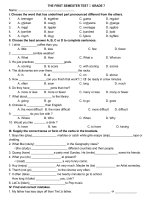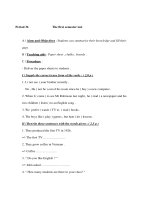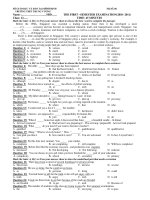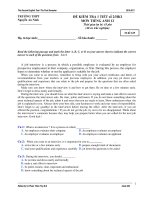THE FIRST SEMESTER TEST ppt
Bạn đang xem bản rút gọn của tài liệu. Xem và tải ngay bản đầy đủ của tài liệu tại đây (25.13 KB, 3 trang )
THE FIRST SEMESTER TEST
Form 12 - Time allotted: 45’
Name:
Class:
PART 1: MULTIPLE CHOICE : Choose the most suitable word or phrase.
1. Our parents join hands to give us a nice house and a happy home.
A. deal with B. manage C. help together D. work together
2. He to London three times this year.
A. was B. will be C. had been D. has been
3. Choose the word which has the underlined part pronounced differently from the rest.
A. answered B. wrapped C. served D. exchanged
4. Choose the word which is stressed differently from the rest.
A. similarity B. independent C. generation D. diversity
5. “You’d better apologize for being so rude”,said my friend.
A. My friend advised me to apologize for being so rude.
B. My friend offered me to apologize for being so rude.
C. My friend warned me to apologize for being so rude.
D. My friend suggested me apologize for being so rude.
6. Identify the underlined word or phrase A, B, C or D that must be changed for the sentence to be correct:
They asked me how long (A) did it take (B) to get to (C) Paris by train (D).
7. The man and his dogs were buried in the demolished building after the earthquake
have just been rescued safely.
A. which B. that C. who D. whom
8. Choose the word that has the underlined part pronounced differently from that of the others:
A. requirements B. subject C. secondary D. levels
9. GCSEs are not compulsory but they are the most common qualification taken by 14,16 - year - old
students.
A. specialized B. fulfilled C. required D. applied
10. Most students in UK prepare carefully for A-level exams.
A. the / ø B. ø / the C. ø / an D. the / an
11. I didn’t come to the party due to the rain.
A. If it didn’t rain , I would come to your party. B. Even though it rained, I came to your party.
C. If it hadn’t rained, I would have come to the party.
D. If it didn’t rain, I wouldn’t come to your party.
12. The ………………year in Vietnam runs from September to June and is divided into 2 terms.
A. academically B. academicals C. academical D. academic
13. Identify the underlined word or phrase A, B, C or D that must be changed for the sentence to be correct:
The result
(A)
of
(B)
the competition
is going to
(C)
announce
(D)
tomorrow.
14. Identify the underlined word or phrase A, B, C or D that must be changed for the sentence to be correct:
Were if I (A) you (B) , I would (C) help (D) him.
15. The government made serious attempts to raise the of living.
A. standard B. cost C. level D. mode
16. Peter is so _____ that he never thinks of anything bad and unsuccessful.
A. optimistic B. disappointed C. pessimistic D. keen
17. Choose the word which has the underlined part pronounced differently from the rest.
A. machine B. change C. achievement D. future
18. Choose the word which is stressed differently from the rest.
A. exam B. common C. degree D. prepare
19. __________________ instructed me how to make a good preparation for a job interview.
A. John Robbins, to that I spoke by telephone, B. John Robbins, that I spoke to by telephone,
C. John Robbins I spoke to by telephone, D. John Robbins, whom I spoke to by telephone,
20. Mr John can’t use his office at the moment. It ___________________________.
A. is redecorated B. has redecorated
C. is being redecorated D.was redecorated
21. Identify the underlined word or phrase A, B, C or D that must be changed for the sentence to be correct:
My mother told (A) me to watch (B) the milk and don’t (C) let it boil over (D) .
22. I could not eat__________ I was very hungry.
A.even though B. in spite C.despite D. in spite the fact that
23. I had my sister take care _____ my children while I was _____ business.
A. with / for B. in / away C. for / in D. of / on
24. Choose the word which is stressed differently from the rest.
A. volunteer B. imitate C. influence D. celebrate
PART 2: SPEAKING
Choose the phrases or sentences A,B, C,or D that best complete the conversations:
1.A :……………….a happy marriage should be based on love
B : I definitely agree!
A. I really know B. As I see it C. Personally, I think. D. Do you think.
2. A: I’m not sure about this soup.It tastes like something’s missing.
B:_________ It tastes fine to me.
A. You’re right B. Oh,I don’t know C. I don’t think so D. I couldn’t agree more
3. A: You're a great dancer. I wish I could do half as well as you.
B: . I'm an awful dancer!
A. You are too kind. B. That's a nice compliment!
C. You've got to be kidding! D. Oh, thank you very much.
4. A: Shall we have a drink when you finish your class?
B: _________________
A. No, we can’t B. All right C. You’re welcome D. You needn’t do that
PART 3 : READING
I. Read the passage carefully, then choose the correct answer.
Many people think that we can learn a lot about the culture of a foreign country simply by living in that
country. However, this is not necessarily true. Often, the longer we stay in a foreign country, the more we
realize how little we actually know about the culture of that country.
Books and talks about other people’s culture can even be dangerous because they concentrate on
cultural differences and exaggerate national character, and sometimes a lot of information they contain is
untrue.
In a study recently carried out in Britain, people were asked to make a list of anything that they thought
was typical of Britain and would interest a foreign visitor there. Most mentioned Shakespeare, the Queen,
village inns, English folk dancing, English castles, and fish chips wrapped in newspaper. Although all of these
characters can be found in British culture, they do not show the real interest of ordinary British people: (They
are, in fact, simply stereotype- that is, general character which people wrongly think are typical.) What is
surprising is that they were suggested by British people themselves as representing their culture. If people have
such a wrong impression of their own culture, how much false would their impression of other cultures be!
1. If we stay a long time in a foreign country, ____________
A. we will sometimes forget about culture of our own country.
B. we can often learn a lot about the culture of the foreign country.
C. we will usually realize our own ignorance about its culture.
D. we can seldom find out anything at all about its culture.
2. When asked about their own culture, many British people___________
A. argued they knew little about British culture. B. gave incorrect answers.
C. said they themselves were not typical of British people. D. were surprised by the question asked.
3. It is easy to _________________
A. know a lot about your own country’s culture. B. know the culture of other countries.
C. give exact information about your own country. D. describle stereotype of your country.
4. The things that are typical of Britain are __________________ .
A. Shakespeare and the Queen.
B. Shakespeare, the Queen, village inns, English folk dancing, English castles, and fish chips wrapped
in newspapers.
C. English folk dancing, English castles, and fish chips wrapped in newspapers.
D. Fish chips wrapped in newspapers.
II. Read the passage and choose the option that best completes each space.
Looking for a job
I finished university six months ago, and I’ve got a (1) in business administration. I enjoy the
course very much although I realize I should have studied a lot harder! A few of my friends have already got
(2) jobs but most (3) me, are still waiting for something suitable to turn up.
(4) , I make sure that I keep myself busy. I look through the job advertisements (5) the
newspapers every day and I also ask all the people I know to tell me if they hear of any (6) where
they work. What I’m looking for is something challenging, and I would certainly be happy to move to another
city or even work (7) for a while.The salary is not so important at this stage, provided I earn
enough to live on, (8) I don’t want to continue having to depend on my parents.
1. A. degree B. paper C. diploma D. course
2. A. full-hour B. full-time C. salary D. wage
3. A. for B. as C. such as D. like
4. A. Meanwhile B. Furthermore C. However D. Moreover
5. A. on B. in C. upon D.at
6. A. positions B. blanks C. vacancies D. posts
7. A. abroad B. domestically C. foreign D. aboard
8. A. therefore B. so C. because D. but
ANSWER KEY
Part 1:
1.D 2.D 3.B 4.D
5.A 6.B 7.B 8.D
9.C 10.B 11.C 12.D
13.D 14.A 15.A 16.A
17.A 18.B 19.D 20.C
21.C 22.A 23.D 24.C
Part 2:
1.C 2.C 3.B 4.B
Part 3:
I. 1.C 2.C 3.D 4.B
II. 1.A 2.B 3.D 4.A
5.B 6.C 7.A 8.C









